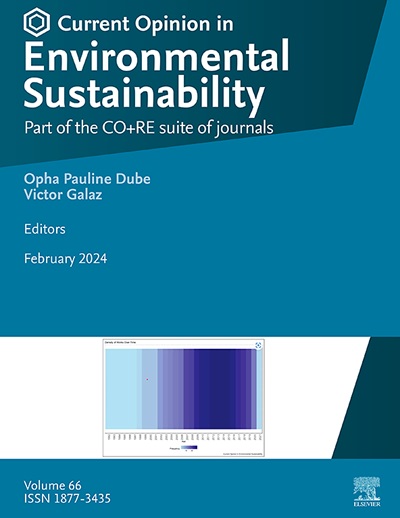当前关于债务换自然的观点:从探索性研究转向实证研究
IF 6.3
2区 环境科学与生态学
Q1 ENVIRONMENTAL SCIENCES
Current Opinion in Environmental Sustainability
Pub Date : 2025-05-02
DOI:10.1016/j.cosust.2025.101538
引用次数: 0
摘要
债务换自然(DNS)已重新成为应对主权债务危机和环境退化双重挑战的重要工具,在2019冠状病毒病疫情后再次受到关注。这些金融工具起源于20世纪80年代,现在涵盖了更广泛的机制,包括中国和债券持有人等非传统债权人的创新参与。这篇综述将不断发展的DNS研究归纳为四个主题领域:结构分析、有效性评估、政治经济考虑和可扩展性潜力。虽然目前的研究主要集中在探索性概念上,但本文主张进行实证研究,以了解DNS的实际结果、障碍和社会经济影响。强调多学科方法,以探索DNS同时加强债务减免、保护和发展成果的能力,并与全球可持续性目标保持一致。未来的研究应优先考虑实证评估、更深入的债权人-债务人分析和可扩展的框架,以优化DNS作为可持续发展的工具。本文章由计算机程序翻译,如有差异,请以英文原文为准。
Current perspectives on debt-for-nature swaps: moving from exploratory to empirical research
Debt-for-nature swaps (DNS) have re-emerged as vital tools to address the dual challenges of sovereign debt crises and environmental degradation, gaining renewed attention post-COVID-19. Originating in the 1980s, these financial instruments now encompass broader mechanisms, including innovative participation by nontraditional creditors like China and bondholders. This review synthesizes evolving DNS scholarship into four thematic areas: structural analysis, effectiveness evaluation, political economy considerations, and scalability potential. While current studies largely focus on exploratory concepts, the article advocates for empirical research to understand DNS’s practical outcomes, barriers, and socioeconomic impacts. Multidisciplinary approaches are emphasized to explore DNS’s capacity to simultaneously enhance debt relief, conservation, and development outcomes, aligning with global sustainability goals. Future research should prioritize empirical evaluations, deeper creditor–debtor analyses, and scalable frameworks to optimize DNS as a tool for sustainable development.
求助全文
通过发布文献求助,成功后即可免费获取论文全文。
去求助
来源期刊

Current Opinion in Environmental Sustainability
ENVIRONMENTAL SCIENCES-ENVIRONMENTAL SCIENCES
CiteScore
13.80
自引率
2.80%
发文量
52
审稿时长
6-12 weeks
期刊介绍:
"Current Opinion in Environmental Sustainability (COSUST)" is a distinguished journal within Elsevier's esteemed scientific publishing portfolio, known for its dedication to high-quality, reproducible research. Launched in 2010, COSUST is a part of the Current Opinion and Research (CO+RE) suite, which is recognized for its editorial excellence and global impact. The journal specializes in peer-reviewed, concise, and timely short reviews that provide a synthesis of recent literature, emerging topics, innovations, and perspectives in the field of environmental sustainability.
 求助内容:
求助内容: 应助结果提醒方式:
应助结果提醒方式:


